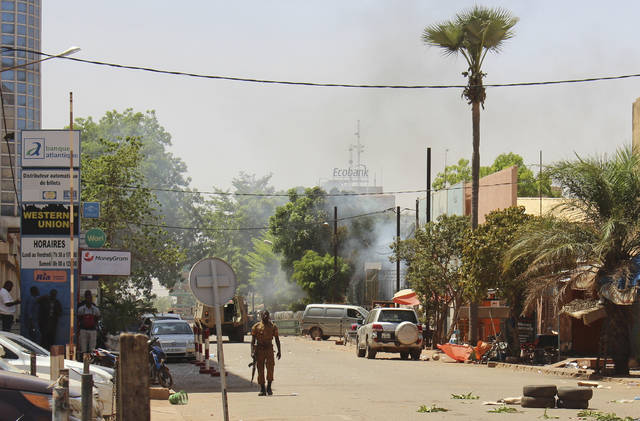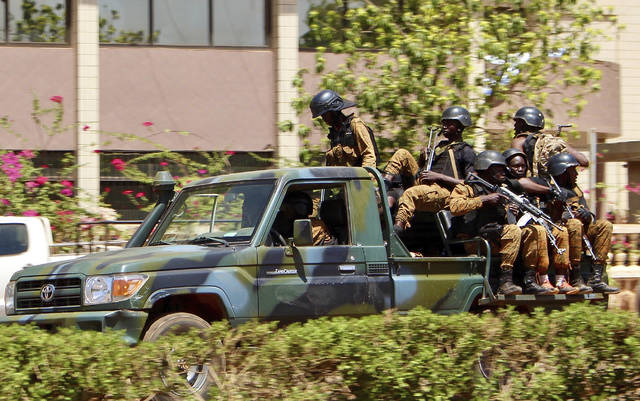OUAGADOUGOU, Burkina Faso — Islamic extremists struck the French Embassy and army headquarters in simultaneous attacks of gunfire and explosives Friday in Burkina Faso’s capital, killing eight people and wounding more than 80 others. All eight militants were slain by security forces.
The violence, which the government called a terrorist attack, marked a further deterioration in the former French colony’s perilous security situation. Islamic militants already have struck twice since January 2016 in the West African country, prompting criticism of the military response each time.
No group claimed responsibility for Friday’s attacks.
One of the militants’ assaults destroyed a room in the army headquarters where senior officers were to have met but was relocated at the last minute, according to Security Minister Clement Sawadogo.
“If the meeting had taken place in the first room, our army would have been beheaded,” Sawadogo said, adding that some of the assailants wore military clothing and seemed to be aware of the planned gathering.
The French Embassy came under attack around 10:15 a.m., with witnesses at the nearby state TV offices telling The Associated Press that the attackers had arrived in a pickup truck, shouted, “Allahu akbar!” and began shooting.
No one in the embassy was hurt, but a gendarme and the four attackers were killed, French Foreign Minister Jean-Yves Le Drian said in televised remarks.
Gunfire and explosions resounded for hours, subsiding by midday. Workers fled nearby offices and helicopters were seen above the embassy.
A similar attack unfolded at the army headquarters across town. The assailants also arrived in a pickup and starting shooting at soldiers, said Moussa Korbeogo, a trader at a nearby market.
Heavy smoke rose from the army joint chief of staff’s office, where witnesses reported loud explosions. Windows were broken there and in nearby buildings.
“Some of the soldiers ran into a nearby bank to seek shelter. Several were killed outside and inside the premises,” Korbeogo said.
Five emergency centers to treat casualties were set up in hospitals, a military barracks and at a stadium in Ouagadougou, said Col. Amade Kafando, director general of Burkina Faso’s army health unit.
French President Emmanuel Macron spoke with President Roch Marc Christian Kabore to express his condolences and support, and also to thank the country’s forces for their quick intervention. Burkina Faso is one of five countries in the Sahel contributing to the so-called G5 force in the region battling extremists.
Macron “reaffirms his determination and the full commitment of France, alongside its G5 Sahel partners, in the fight against terrorist movements,” according to a statement from the French leader.
The Paris prosecutor’s office said it has opened a preliminary attempted murder investigation into the attack because the embassy was among the targets, a French judicial official said on condition of anonymity because he is not authorized to talk to the media identified.
U.N. Secretary-General Antonio Guterres strongly condemned the attacks and expressed solidarity with Burkina Faso’ government and people. In a statement, he affirms the United Nations’ commitment “to support Burkina Faso in its efforts to fight violent extremism and terrorism, sustain the security sector reform, promote national reconciliation and create the conditions for sustainable peace and development.”
Ouagadougou has been attacked by Islamic extremists targeting foreigners at least twice in the past few years. Security forces have struggled to contain the attacks.
In August, extremists opened fire as patrons dined at a restaurant, killing at least 18 people. In January 2016, Islamic extremists attacked another cafe popular with foreigners, killing 30 people.
Al-Qaida in the Islamic Maghreb claimed responsibility for the 2016 killings along with the jihadist group known as Al Mourabitoun. But experts say the terror threat in Burkina Faso is increasingly homegrown.
The landlocked nation of Burkina Faso is one of the poorest countries in the world. It shares a northern border with Mali, which has long battled Islamic extremists.
The northern border region near Mali is the home of Ibrahim Malam Dicko, a preacher who has claimed responsibility for recent deadly attacks on troops and civilians. His association, Ansarul Islam, is considered a terrorist group by Burkina Faso’s government.
Among his objectives has been ending the use of French in regional schools. Forces backed by the French military have failed to capture Dicko.
But he is not the only threat. Northern areas near the border with Mali have been a regular target of attacks by various extremist groups, some of them vowing to step up the bloodshed in response to the recent deployment of the G5 Sahel force. The 5,000-member force combines troops from Burkina Faso, Mali, Niger, Chad and Mauritania, with France leading the efforts to bring in international funding.
The countries’ troops join forces where they can. In response to the new violence in eastern Burkina Faso, troops from Burkina Faso and nearby Mali and Niger have increased patrols. Extremists are thought to be hiding in forested areas in the border region.
Longtime President Blaise Compaore was ousted in a popular uprising in late 2014, and a coup was mounted the following year but ultimately failed. Some critics say the military has suffered during the years of political upheaval.
During the 2016 assault, security forces waited for hours before trying to intervene.
Threats by Islamic extremists also moved into new parts of Burkina Faso in February with an attack by 10 people in an eastern town that killed an officer and wounded two others.
Increased attacks at the border with Mali have forced thousands to flee in the past year. An Australian doctor who had spent decades treating civilians was also abducted along this border and remains missing.
———
Associated Press writers Carley Petesch and Krista Larson in Dakar, Senegal, and Angela Charlton in Paris contributed to this report.



